Using the best marine battery charger will help you avoid many common issues. One of the most important aspects when it comes to your boat’s battery performance is the way and extent to which the battery is charged after being depleted to acceptable levels. An overcharged battery sheds materials from its plates and boils away its electrolytes. In an undercharged battery, the plates get clogged with lead sulfate, also shortening its life.
Don’t know where to start? Have no idea how these devices work? Continue reading for everything you need to know about marine battery chargers!
See The Quick Comparison Chart
Why Should You Have a Marine Battery Charger?
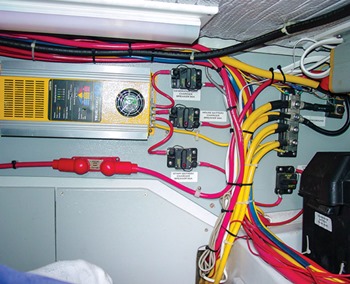 A marine battery charger is an essential part of your boating gear. Since the entire electrical system depends on battery power, possessing an onboard battery charger will assist you in getting enough energy load for your needs.
A marine battery charger is an essential part of your boating gear. Since the entire electrical system depends on battery power, possessing an onboard battery charger will assist you in getting enough energy load for your needs.
If you haven’t been a boat owner for a long period, in time, you will agree with us when we tell you that having your onboard charger is one of the best things you can get for your boat. However, you need to make sure that the charger is compatible with your battery. We will get to that a bit later.
A marine battery charger enables you to leave your batteries in the vessel. You do not have to use any other thing for it to charge. All you need to do is plug it in its AC cord which is attached to the charger. Most marine chargers are computer-controlled, so you do not have to worry about overcharging.
Many people are working and also depending on the power of their boats’ batteries. It is a real challenge to find yourself hindered in the middle of the open water. Therefore, you should always be prepared and have an onboard marine battery charger at hand.
Benefits Of Marine Battery Chargers
When traveling by boat, you will often cover long distances in the open water. Having to deal with a power outage so far from anyone is not a pleasant experience. Therefore, having a battery charger with you can be extremely helpful.
There are a few advantages offered by marine battery chargers. For instance, such a unit has a multi-stage switching. This means that it will charge and sustain your batteries throughout their charging process in a safe way.
Moreover, the linear charging type is simple and reliable. Also, it has a vented design that is meant to reduce heat. This type is usually water-resistant as well.
Electronic chargers are capable of readjusting and servicing both deep-cycle marine batteries and cranking-type units. If you have a small boat, you can choose a portable charger that is much more comfortable to use. It is also a great option if you have to charge a number of vessels.
Best Marine Battery Chargers Comparison Chart
| PRODUCT | DETAILS | ||
|---|---|---|---|
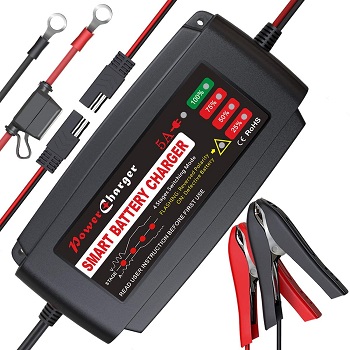 | BMK 12V 5A Smart Battery Charger Portable Battery Maintainer |
| View On Amazon |
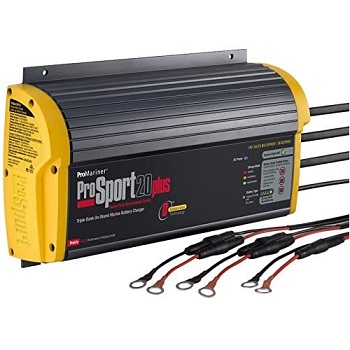 | ProMariner 43021 ProSport 20 Amp 3 Bank Battery Charger |
| View On Amazon |
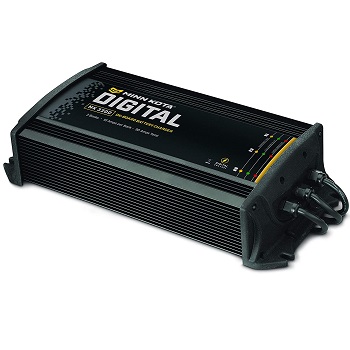 | Minn Kota Precision On-Board Charger |
| View On Amazon |
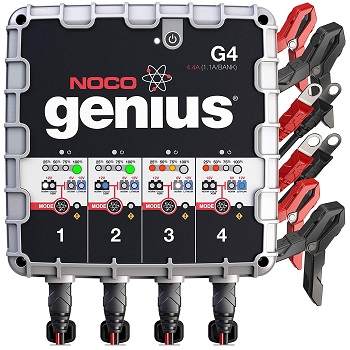 | NOCO Genius G4 6V/12V 4.4 Amp 4-Bank Battery Charger and Maintainer |
| View On Amazon |
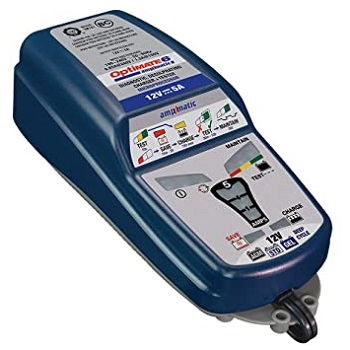 | TECMATE OptiMATE 6 Ampmatic 12V 5A sealed battery charger |
| View On Amazon |
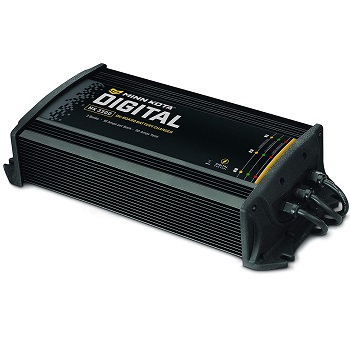 | Johnson Outdoors Minn Kota On-Board Digital Charger |
| View On Amazon |
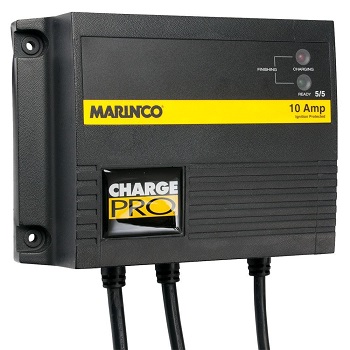 | Marinco ChargePro On-Board Battery Chargers |
| View On Amazon |
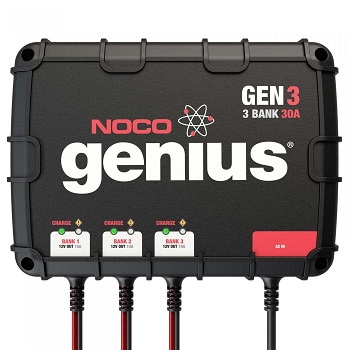 | NOCO Genius GEN3 30 Amp 3-Bank On-Board Battery Charger |
| View On Amazon |
Best Marine Battery Chargers Reviews
1. BMK 12V 5A Smart Battery Charger Portable Battery Maintainer
 If you have a battery between 15 to 100Ah, you can use this charger. It is made of high-quality ABS and it is rated at IP65. Thanks to these features and its waterproof construction, this compact battery charger comes in handy whenever you need it. The BMK 12V 5A Smart Battery Charger Portable Battery Maintainer features the constant pulse current maintenance function.
If you have a battery between 15 to 100Ah, you can use this charger. It is made of high-quality ABS and it is rated at IP65. Thanks to these features and its waterproof construction, this compact battery charger comes in handy whenever you need it. The BMK 12V 5A Smart Battery Charger Portable Battery Maintainer features the constant pulse current maintenance function.
Due to this, the charger is protected against overcharge and discharge of your battery. The automatic charging process has four stages through the MCU controller as well as LED indicators. With their help, you can identify the amount of energy and also monitor the entire charging process.
Moreover, this unit stops automatically when your battery is fully charged, so you do not have to stay close to the units throughout the entire process. This unit can be used for boats, cars, motorcycles, lawnmowers, electric vehicles, electric tools, and emergency battery charging.
Pros
- This charger also indicates if your battery is faulty
- It checks if the connection is correct before it powers up
- Connecting and disconnecting from the battery is extremely fast and easy
Cons
- Batteries that are under 15 Ah may not charge so well
- The ring connectors are single size
2. ProMariner 43021 ProSport 20 Amp 3 Bank Battery Charger
 Compared to many other battery chargers out there this one is a beast! It has 20 amps and it is capable of charging a battery in a reasonable time. Besides being able to fast-charge batteries, this model can also maintain them topped up and it does not overcharge them.
Compared to many other battery chargers out there this one is a beast! It has 20 amps and it is capable of charging a battery in a reasonable time. Besides being able to fast-charge batteries, this model can also maintain them topped up and it does not overcharge them.
The ProMariner 43021 ProSport 20 Amp 3 Bank Battery Charger features three banks so that it can charge three separate batteries at the same time. There are also indicators on the charger that let you know how each battery is doing. A neat thing about this model is its ability to recondition old batteries and charge even batteries that are completely dead.
The charger has a sturdy construction with an aluminum chassis to protect it and offer increased durability. Moreover, this battery charger is loaded with various safety features that keep reverse polarity, over-voltage, over-temperature, or overload from occurring.
Pros
- This model supports 12, 24, and 36-volt batteries
- It can charge AGM, Gel, flooded, as well as HP AGM batteries
- The Distributed-On-Demand function ensures the maximum amps being produced
Cons
- This model does not support 4D batteries
- It can get a bit too warm when charging
3. Minn Kota Precision On-Board Charger
 Since it is equipped with a LED Status Display, this model will keep you updated about the charging process at all times. The three LED lights are yellow, green, and red. If the yellow light is on, it means that it is charging. The green one appears when the battery is fully charged, while the red LED notifies if there is an issue with the connection.
Since it is equipped with a LED Status Display, this model will keep you updated about the charging process at all times. The three LED lights are yellow, green, and red. If the yellow light is on, it means that it is charging. The green one appears when the battery is fully charged, while the red LED notifies if there is an issue with the connection.
It is as simple as that with the Minn Kota Precision On-Board Charger! For increased safety, the charger comes with an AC Plug Holder. Since the unit is shock-resistant, vibration-resistant, as well as waterproof, it can safely be used on a boat.
Thanks to the Automatic Temperature Compensation, this charger adjusts based on the temperature outside. This feature prevents any damage to your battery from happening. Even if you do no use the charger for a while, it will not drain your batteries when you need it again.
Pros
- Installing and using the device is extremely easy
- This model features three banks with 5 amps for each
- It is saltwater-tested, as well as 100% corrosion-resistant
Cons
- After around two years of usage, the unit might stop working
- It is not the fastest charger you can find
4. NOCO Genius G4 6V/12V 4.4 Amp 4-Bank Battery Charger and Maintainer
 This product comes from a company that is well-known for its quality and safe products. The NOCO Genius G4 6V/12V 4.4 Amp 4-Bank Battery Charger and Maintainer is built to charge lead-acid and lithium-ion batteries of 12 volts and up to 40 ampere-hours.
This product comes from a company that is well-known for its quality and safe products. The NOCO Genius G4 6V/12V 4.4 Amp 4-Bank Battery Charger and Maintainer is built to charge lead-acid and lithium-ion batteries of 12 volts and up to 40 ampere-hours.
Moreover, it can efficiently maintain marine, automotive, power sport, RV, lawn and garden, as well as deep-cycle batteries. Compared to other standard battery chargers, this model charges two times faster. What is more, it can restore damaged batteries.
This model is meant to be used for CANBUS electrical systems and micro-hybrid start-stop vehicles. It is guided by an onboard microcomputer that monitors the battery’s activity for efficient and safe charging.
It also reduces energy consumption and offers repetitive levels of safety protection which includes reverse polarity, spark-proof technology, as well as overcharge protection. Thanks to the rubberized base and the external mounting holes, surface scratches or slipping are avoided.
Pros
- This model offers a range of various bank options
- It is very portable, compact, and lightweight for easy and convenient moving
- It is UV and water-resistant with an IP rating of 65
Cons
- In some cases, the included eyelet cables may be too small for boat batteries
5. TECMATE OptiMATE 6 Ampmatic 12V 5A sealed battery charger
 The TECMATE OptiMATE 6 Ampmatic 12V 5A sealed battery charger is a fully-automatic and fully-sealed marine battery charger of 12 volts. Since it identifies the difference between a sulfated and a discharged battery, it is extremely useful and efficient.
The TECMATE OptiMATE 6 Ampmatic 12V 5A sealed battery charger is a fully-automatic and fully-sealed marine battery charger of 12 volts. Since it identifies the difference between a sulfated and a discharged battery, it is extremely useful and efficient.
During the charging process, the unit starts on a low voltage of 0.5 for a de-sulfation recovery. The current control of the cells can save your battery which is why this model is so popular. Moreover, the charger can be used both indoor and outdoor. It can easily operate even at -104 Fahrenheit degrees.
The unit is also waterproof which is extremely important for marine use. Thanks to the wall mounts, you can easily install the device anywhere you want. With this product, you will also receive a 6-foot AC supply lead, a 6-foot charge lead ending in an SAE connector, as well as a battery clip set.
Pros
- Since the unit is fully-automatic, no manual intervention is required
- The charger is compact, lightweight, and extremely easy to move around
- It provides early warning of any battery issues
Cons
- The status, as well as the lights of the unit, might be a bit difficult to understand
6. Johnson Outdoors Minn Kota On-Board Digital Charger
 If you want to have information about the charging process at all times, you might be interested in this model. It features a LED status display that is very easy to understand. The unit comes with an AC plug holder that is meant to increase the level of safety when using the charger.
If you want to have information about the charging process at all times, you might be interested in this model. It features a LED status display that is very easy to understand. The unit comes with an AC plug holder that is meant to increase the level of safety when using the charger.
The Johnson Outdoors Minn Kota On-Board Digital Charger is an excellent choice if you are looking for an onboard unit. Since it is meant to be used in the harsh marine environment, the device is shock and vibration resistant, as well as waterproof.
Thanks to the Automatic Temperature Compensation features, this unit can adjust according to the temperature outside in order to prevent any battery damage from occurring. In case you have not used this charger in months, you do not have to worry as it will not drain the battery once you start using it again.
Pros
- The unit is protected against short circuit, ignition, as well as corrosion
- The mounting process is easy and convenient
- It provides fully-automatic multi-stage charging
Cons
- The unit is a bit heavy and should be installed on a sturdy surface
- It might stop functioning after about two years of frequent use
7. Marinco ChargePro On-Board Battery Chargers
 If you want to get a marine battery charger, you should get a unit that you can efficiently use for a long time. The Marinco ChargePro On-Board Battery Chargers features an innovative technology that guarantees to offer outstanding performance and durability in the tough marine environment.
If you want to get a marine battery charger, you should get a unit that you can efficiently use for a long time. The Marinco ChargePro On-Board Battery Chargers features an innovative technology that guarantees to offer outstanding performance and durability in the tough marine environment.
Since it is equipped with a digital micro compressor, the unit is able to deliver effective, accurate, and complete battery charging. Besides being waterproof, the device featured a sealed and corrosion-proof thermal epoxy.
The charger has a particular housing that protects it even more against the otherwise damaging elements such as salt, moisture, shocks, and vibrations. Moreover, you can charge various types of batteries without undercharging or overcharging them.
What is more, the unit is designed with sense-send technology that identifies the power requirements of different batteries and sends the correct amperage. This product can also be used to revive a completely depleted battery.
Pros
- The unit provides a very intuitive operation
- It can be used to charge AGMs, gel, or flooded batteries with no issues
- For your peace of mind, the product is covered by a two-year manufacturer’s warranty
Cons
- The unit does not include marine-grade stranded wire, which could be a downside for some
8. NOCO Genius GEN3 30 Amp 3-Bank On-Board Battery Charger
 This battery charger can be used not only for boats but for tractors as well as other equipment. Since it has a fully-sealed and waterproof construction, it is a great choice for boat batteries. The NOCO Genius GEN3 30 Amp 3-Bank On-Board Battery Charger comes with a smart VOSFX processor.
This battery charger can be used not only for boats but for tractors as well as other equipment. Since it has a fully-sealed and waterproof construction, it is a great choice for boat batteries. The NOCO Genius GEN3 30 Amp 3-Bank On-Board Battery Charger comes with a smart VOSFX processor.
It is meant to allow you to monitor the power input, the charger, and the attached battery at all times. This model can charge and also maintain lead-acid batteries of all types that are from 25 to 230Ah. Moreover, you do not have to worry about sparks due to its safe construction that protects you from overheating short courses, open circuit, or reverse battery hookup.
You should also know that this model is IP68 rated, which means that it can withstand the harsh marine environment. Also, if the charger is in Bulk charge mode for a prolonged period, it will automatically shut off.
Pros
- The Rapid Charging Technology allows you to power up batteries twice as fast
- It is lightweight and compact, therefore easy to carry around and store
- The product is backed up by a five-year warranty
Cons
- The screws that are included are not self-tapping
How Does an Onboard Marine Battery Charger Work?
Onboard battery chargers are made up of one and up to four battery chargers that are housed in a single chassis. These are also called banks. Boats or any other marine vehicles do not have alternators so the batteries cannot charge similarly to cars and other land vehicles.
The marine battery charger charges the battery in your boat like no other type of charger can. Still, you need to be careful to use a unit the has the same number of cells like the one in your battery.
Types Of Marine Battery Chargers
What you need to know is that not every type of battery charger is suitable for the battery in your boat. There are various types of batteries for trolling motor, and you need to know yours before you select a charger.
1. Types of Marine Chargers
If we are to categorize the marine battery chargers, there are two important classes.
1.1 Manual Marine Chargers
These types of chargers require you to turn them on and off manually. Also, you will need to adjust the voltage and the current based on your battery’s requirements.
1.2 Automatic Marine Chargers
Unlike manual chargers, you do not even have to be there while your battery is being charged. The automatic units sense the inner voltage and current, and they even switch off when the battery is fully charged.
2. Types of Marine Batteries
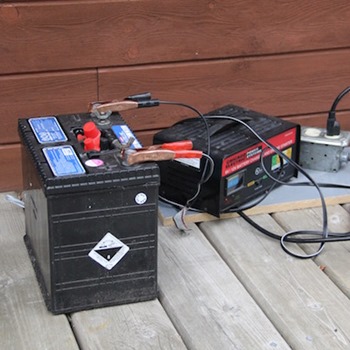 As previously mentioned, it is extremely important to know what type of battery your boat is using before selecting a charger for it. Marine batteries can be found in three chemical types which are flooded, gel, and AGM or Absorbed Glass Mat. Whatever the type, these batteries are rated by energy output that is usually represented by ampere-hours.
As previously mentioned, it is extremely important to know what type of battery your boat is using before selecting a charger for it. Marine batteries can be found in three chemical types which are flooded, gel, and AGM or Absorbed Glass Mat. Whatever the type, these batteries are rated by energy output that is usually represented by ampere-hours.
They are also categorized by how many cycles or charges they are likely to resist in their lifetime. Furthermore, these factors, output and lifespan, usually also dictate the price. The use, type, and the number of batteries that are recommended for your vessel depend on the type of boat, its usage, as well as your budget.
3. What You Need to Remember
Boat owners usually do not realize how much their behavior affects the durability of a battery. Normally, a battery that is charged and maintained properly should last three years, at least! So, what does it mean to properly charge a battery?
You see, the best deep-cycle marine batteries used for marine purposes last very long and charge quickly if they are charged in separate phases that are also called the Ideal Charge Curve. A battery will accept more current when it is discharged but the amount of voltage needed to charge the battery properly varies for each phase. This depends on temperature.
You should know that using a smart charger to adjust the voltage in each phase, as well as recharging the unit the same day it runs down, will allow you to get the most of your battery.
However, the most important thing you need to remember is that you have to check whether the charger is compatible and suitable for your batteries before you get it.
Marine Battery Charger Buying Guide
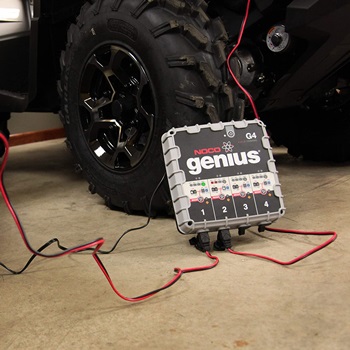 In terms of security, you should never leave for a boating trip without a swim vest for your toddler. It is just as important to have a battery charger at all times. You certainly do not want to remain stuck in the middle of nowhere with a dead battery! Still, before you decide on what charger to get, you need to learn a few things.
In terms of security, you should never leave for a boating trip without a swim vest for your toddler. It is just as important to have a battery charger at all times. You certainly do not want to remain stuck in the middle of nowhere with a dead battery! Still, before you decide on what charger to get, you need to learn a few things.
1. Type and Compatibility
Before you select the type of charger you want to get, it is extremely important to consider the type of batteries in your boat. Each type of battery has its specific requirements and you need to keep this in mind.
Therefore, each charger states what types of batteries it can be used for. There are chargers that support only one specific type of battery, and there are those that support multiple types.
There are also chargers that are equipped with microprocessors that can read your battery type and also adjust its voltage and amperage to meet its requirements. So, before you decide anything, make sure you know what your boat runs on in terms of electronics.
2. Voltage
Another vital aspect you need to consider is your battery receiving the correct amount of voltage from the charger. In this sense, batteries are extremely different and your need to care for yours accordingly. In most cases, marine batteries run on 12V systems, but this might not be your case.
You should never presume, but check first! We recommend looking for a charger that can change to both 6 and 12 V. There are also batteries that support switching between these two voltages.
Also, there are chargers that automatically switch between these two alternatives and do not require manual intervention. Again, it is essential that you check your battery type and requirements prior to choosing a suitable marine charger.
3. Number of Banks
In case you have more than one marine battery, you should search for a charger with multiple banks. This will allow you to charge a number of batteries at the same time. This feature is useful for boats that use both a starter and a deep-cycle battery, and also for large vessels that use several different batteries.
Another important consideration in this sense is to think about the option of adding an extra battery in the feature. The idea is to simplify your life and not complicate it. What would be the point of getting a different charger for each of your batteries when you have the possibility to use one for all your units?
4. Size
A few essential features can affect the size of your charger. However, the larger it is, the more power it will be able to deliver, and the more features they will have like a wider range of banks. We recommend that you go for a size that is compatible with your vessel.
Therefore, you need to think about where you are going to store the unit, as well as how you are going to use it. This does not apply to portable chargers in which case it will not be such an issue, provided it is light enough to easily be moved from one spot to another.
5. Charging Time
Various types of batteries have different charging times due to a number of reasons, one of them being the size of the unit. The type of battery also has an influence because each accepts a distinct type of amperage.
Therefore, the time your battery charger requires to do its job also depends on a series of factors. However, the more powerful the device is, the faster it will be able to charge your battery. This is not such an important aspect if you need a charger for when your vessel is stored away.
6. Recovery Time
This is another aspect you should keep in mind. It is determined by the ability of your battery to recover its charge after it has been fully depleted. Usually, the higher the amperage your charger is able to provide, the shorter the recovery time of your battery. This aspect is important depending on how much you use your battery and how often.
The best chargers will be able to recover your unit in only a few hours, and others might take longer. In case you are using your boat for many days in a row, a charger with fast-charging abilities is extremely important.
7. Onboard or Portable?
You need to know that you also have this option. The choice depends mostly on the type of boat you have. If you have a small one, a portable unit is a great option.
If your vessel is larger and uses more than one battery, an onboard charger would be a wiser choice. It would also provide a constant power source, and that way, you will never run out of charge.
8. Power Source
If you are going for an onboard charger, you need to make sure that you have easy access to a shore power section when you are docked up and leave it overnight.
This is not an important requirement if you are only going to use your boat for a day and return home. Portable chargers offer a good advantage in this sense, as you can power them in your home.
9. No Overcharge!
Some chargers can undercharge or overcharge your battery. In the long run, your battery will get damaged much quicker.
When a battery is overcharged, it will overheat and could easily get permanently damaged. For this, you will need to remember to check the information we discussed earlier in our guide, and get a charger that is perfectly compatible with your battery.
10. Durability
A marine battery charger is not something you get every day. Moreover, you want to know that you can rely on it. Therefore, you should get a unit that is durable and made of high-quality materials.
Moreover, it should be able to withstand the harsh marine conditions, including water and salt air resistance, corrosion resistance, shocks, and vibrations.
How To Install Onboard Marine Battery Charger?
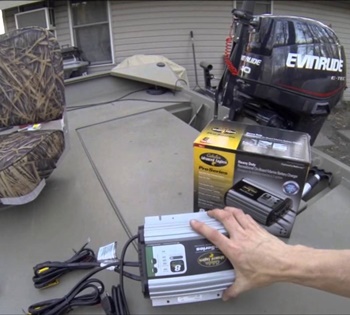 First, each quality product comes with clear instructions, and you should always follow the manufacturer’s indications. However, you can also do more research on this, just to make sure you know what it is all about.
First, each quality product comes with clear instructions, and you should always follow the manufacturer’s indications. However, you can also do more research on this, just to make sure you know what it is all about.
We will also provide some steps to install your marine charger. Before we go into that, however, we need to mention that some models already come with an AC that is connected to the charger.
In a well-ventilated and dry place, you should mount the charger with stainless steel bolts and nuts or self-tapping screws. In case your unit has a maximum output of 2 amps, you ought to use a bigger fuse, such as a 25 amp terminal-mounter model.
Prior to doing the crimping, cover the joint with heat-shrink tubing and warm it up with a hot-air gun, or even a hairdryer. Afterward, you can terminate wires with crimp-on ring terminals. This will make the connection waterproof.
Every about 18 inches of the cables should also be well-supported. For this, you can use plastic clips, cable ties, or anything similar.
Once you have connected the DC well, look at the AC side. If it lacks having the first connection, you will need to add it. Also, makes sure you read the installation instructions for the wire size.
Maintenance & Safety Tips For Marine Battery Chargers
Maybe one of the things that attracted your attention to your marine battery charger was that it is maintenance-free. However, we need to mention that this only means that you do not have to do all the check-ups and perform various procedures as you would with a lower-end product.
If you want to enjoy your device for the longest time possible and keep your devices and yourself safe, at the same time, there are a few things you should do.
1. Marine Battery Charger Maintenance
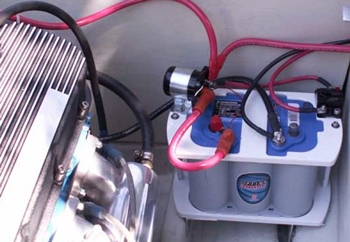 One of the recommended things is to check the terminal clamps periodically because they need to be maintained clean as well as free of corrosion. To achieve this, you can soak them in petroleum jelly. You can also use an anti-corrosion spray.
One of the recommended things is to check the terminal clamps periodically because they need to be maintained clean as well as free of corrosion. To achieve this, you can soak them in petroleum jelly. You can also use an anti-corrosion spray.
You should also check for any loose connection and fix them if that should be the case. They must be kept tight. Even if your charger is waterproof or water-resistant, that does not mean that you can soak it in water.
Try to keep it as dry as possible and store it in a place on your boat where not so much water can enter. Moreover, you should not keep the unit in direct sunlight. Usually, you should keep it in a dry and well-ventilated place.
2. Safety Tips
There are a few other tips you should keep in mind such as making sure that the device is unplugged before connecting or disconnecting it to the battery.
Make sure you know your battery’s requirements and follow the charging procedure as stated in the manufacturer’s instructions. In case you notice that your battery starts overheating, remove the charger carefully and get in touch with the manufacturer immediately.
You should also keep your hands protected from acid. For this, you can use gloves when handling your battery.
FAQ About Marine Battery Chargers
1. How To Size a Marine Battery Charger?
Size, in this particular case, does not refer to the physical dimensions. It is rather in regard to how many ampere-hours your battery stores. Let us take a reliable deep-cycle battery’s case, which is rated at 100 ampere-hours.
If the battery is completely depleted, in order to fully charge this with a 10-amp marine charger, it would require 11 hours of charging. If you follow a simple rule, you should never go wrong. Divide the amp-hour rating on the battery by the rating of the charger, and add about 10% of the additional period in order to top off the unit completely.
If you want to shorten the charging time, you should get a charger with more amps. However, if you are not in a hurry, or simply do not care how much it takes for the battery to charge, you can also go for a smaller charger.
2. How Long Does It Take To Charge a Marine Battery?
Each battery has its own charging time, depending on the charger you are using. The most important factor you need to consider is how many amp-hours your battery is rated to, and how many amps the charger can deliver.
If your battery is rated 40 amps and your charger, 10, you should divide the amps on the battery by the ones of the charger. In hour case, 40 divided by 10 means four hours. However, in order to top off a completely dead battery, you should add about 10 percent of additional time, which in this case is 4.
Of course, 4 minutes are not extremely important, but if we are talking about batteries rated with more ampere-hours an extra hour is important.
3. Can You Overcharge a Marine Battery?
Yes, it is possible to overcharge your battery. Smart chargers are great in this sense because they automatically shut off when the unit is completely charged. If you do not have such a charger, you need to be very careful as overcharging is worse than over-discharging a battery.
When this happens, the acid inside will start to boil or percolate. This can cause your battery to crack and even explode.
4. Can I Use a Car Battery Charger for My Marine Battery?
No, you should never do this! A car battery charger on trickle charge is way too low for the job. Make sure you check the requirements of your battery and the ampere-hours rating. Moreover, when you get the charger, make sure it is suitable for your battery.
It is extremely important to use the right charger and to perform the charging process correctly. Otherwise, you risk permanently ruining your battery and even your boat.
Wrap Up
Are you frequently on the open water, enjoying relaxing boat trips? You certainly do not want to spoil your good time if your battery dies on you. If you want to avoid something like this from happening, we recommend that you look for the best marine battery charger you can find. It will help you the most in situations that could turn out very unpleasant.
However, do not forget to do your homework and get a model that is suitable for your battery or batteries. Luckily, there are many types of products in this line, and you will be able to find a unit that meets all your needs. In case your boat operates on multiple batteries, you can get a unit with several banks. If you want to know what some of the favorites are among boat owners, check our marine battery charger reviews.
Bonus guide: marine GPS chartplotter reviews
Great information